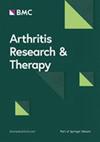埃希氏菌的生长易导致系统性红斑狼疮病情加重
IF 4.9
2区 医学
Q1 Medicine
引用次数: 0
摘要
系统性红斑狼疮(SLE)与宿主肠道菌群失调有关。在此,我们进行了粪便肠道微生物组测序,以研究系统性红斑狼疮致病肠道微生物及其潜在机制。对134名健康对照组(HCs)和114名系统性红斑狼疮病例进行了16S核糖体RNA(rRNA)测序,并对97名健康对照组(HCs)和124名系统性红斑狼疮病例进行了猎枪元基因组学研究。评估了粪便微生物的变化以及与临床表型的关联,并通过扩增子分析确定了与系统性红斑狼疮相关的微生物属。接着,应用元基因组测序技术准确鉴定了微生物种类,并发现了与系统性红斑狼疮相关的微生物代谢途径和免疫原肽。最后,通过给狼疮易感MRL/lpr小鼠灌胃,确认了特定类群对疾病发展的贡献。系统性红斑狼疮患者的肠道微生物群丰富度降低,组成发生改变,尤其是狼疮肾炎和活动期患者。蛋白菌/类杆菌(P/B)比率显著上调,埃希氏菌被确定为系统性红斑狼疮患者肠道微生物群中最主要的扩增菌属,其次是元基因组学准确定位的大肠埃希氏菌和未分类的埃希氏菌。大肠埃希菌、嘌呤核苷酸挽救或肽聚糖成熟的代谢途径与系统性红斑狼疮疾病活动指数(SLEDAI)之间,以及大肠埃希菌的多个表位与疾病活动或肾脏受累表型之间主要存在显著关联。最后,通过灌胃粪便大肠杆菌发现,它能上调狼疮相关的血清特征并加重 MRL/lpr 小鼠的肾小球病变。我们描述了一种新型的系统性红斑狼疮加重埃希氏菌生长的特性,并认为它对系统性红斑狼疮进程的贡献可能部分与代谢物的变化以及肠道微生物相关表位和宿主自身抗原的交叉反应有关。这些发现可以让人们更深入地了解肠道埃希氏菌在系统性红斑狼疮发病过程中的作用。本文章由计算机程序翻译,如有差异,请以英文原文为准。
Outgrowth of Escherichia is susceptible to aggravation of systemic lupus erythematosus
Systemic lupus erythematosus (SLE) is linked to host gut dysbiosis. Here we performed faecal gut microbiome sequencing to investigate SLE-pathogenic gut microbes and their potential mechanisms. There were 134 healthy controls (HCs) and 114 SLE cases for 16 S ribosomal RNA (rRNA) sequencing and 97 HCs and 124 SLE cases for shotgun metagenomics. Faecal microbial changes and associations with clinical phenotypes were evaluated, and SLE-associated microbial genera were identified in amplicon analysis. Next, metagenomic sequencing was applied for accurate identification of microbial species and discovery of their metabolic pathways and immunogenic peptides both relevant to SLE. Finally, contribution of specific taxa to disease development was confirmed by oral gavage into lupus-prone MRL/lpr mice. SLE patients had gut microbiota richness reduction and composition alteration, particularly lupus nephritis and active patients. Proteobacteria/Bacteroidetes (P/B) ratio was remarkably up-regulated, and Escherichia was identified as the dominantly expanded genus in SLE, followed by metagenomics accurately located Escherichia coli and Escherichia unclassified species. Significant associations primarily appeared among Escherichia coli, metabolic pathways of purine nucleotide salvage or peptidoglycan maturation and SLE disease activity index (SLEDAI), and between multiple epitopes from Escherichia coli and disease activity or renal involvement phenotype. Finally, gavage with faecal Escherichia revealed that it upregulated lupus-associated serum traits and aggravated glomerular lesions in MRL/lpr mice. We characterize a novel SLE exacerbating Escherichia outgrowth and suggest its contribution to SLE procession may be partially associated with metabolite changes and cross-reactivity of gut microbiota-associated epitopes and host autoantigens. The findings could provide a deeper insight into gut Escherichia in the procession of SLE.
求助全文
通过发布文献求助,成功后即可免费获取论文全文。
去求助
来源期刊

Arthritis Research & Therapy
RHEUMATOLOGY-
CiteScore
8.60
自引率
2.00%
发文量
261
审稿时长
14 weeks
期刊介绍:
Established in 1999, Arthritis Research and Therapy is an international, open access, peer-reviewed journal, publishing original articles in the area of musculoskeletal research and therapy as well as, reviews, commentaries and reports. A major focus of the journal is on the immunologic processes leading to inflammation, damage and repair as they relate to autoimmune rheumatic and musculoskeletal conditions, and which inform the translation of this knowledge into advances in clinical care. Original basic, translational and clinical research is considered for publication along with results of early and late phase therapeutic trials, especially as they pertain to the underpinning science that informs clinical observations in interventional studies.
 求助内容:
求助内容: 应助结果提醒方式:
应助结果提醒方式:


